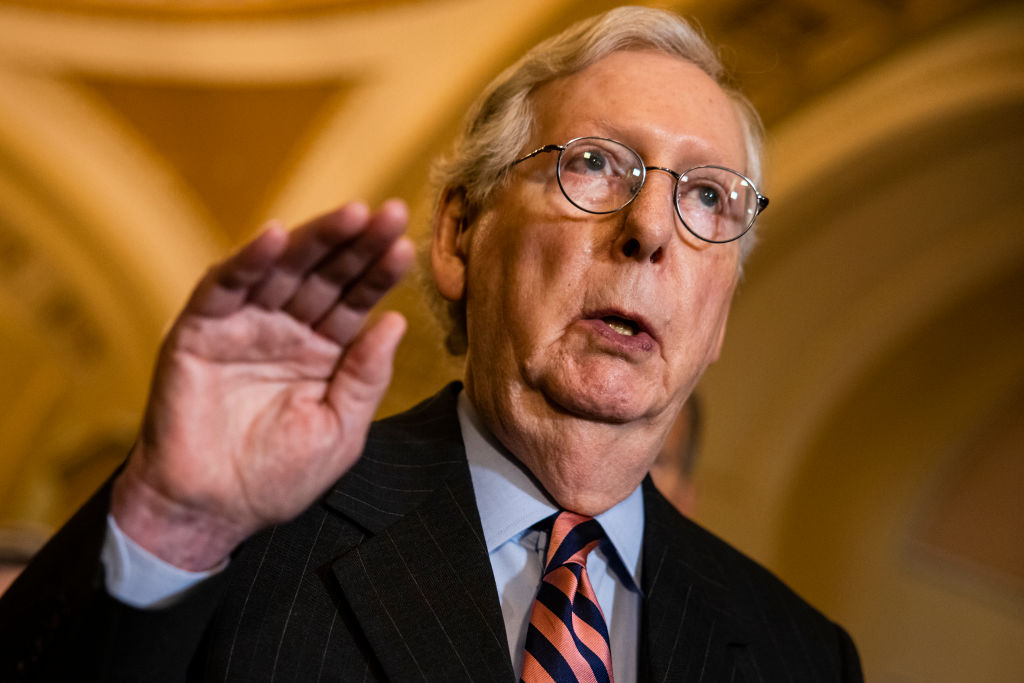Just in time for the holidays, lawmakers will soon approve another increase to the country’s debt limit, perhaps by as much as $2.5 trillion. And like so many of us this time of year, Uncle Sam will continue running up his credit card, spending money on things he can’t afford and often doesn’t really need.
That said, there’s little doubt that the coming debt ceiling hike is a necessary (if self-serving) gift from our nation’s capital.
After all, legislators from both parties have already authorized trillions in spending, knowing full well the country’s dismal fiscal situation. And without the ability to borrow more money, it’s clear that Washington will soon be unable to pay its bills, guaranteeing an economic calamity that would send shockwaves through global markets and crush the U.S. dollar.
So before skipping town for their holiday break, perhaps Congress should consider leaving one more present under America’s Christmas tree — an end to the debt ceiling.
If getting rid of the statutory debt limit sounds like a liberal fantasy, that’s fair. But I’m having trouble understanding the conservative argument for keeping it.
The debt ceiling is supposed to make Washington accountable for the money it spends. Yet how’s that working out? The nation’s debt stands at $29 trillion.
Some conservatives insist that the debt limit still serves a purpose, if only to “shame” legislators for their fiscal irresponsibility. Because if any class of human beings is susceptible to shame, it’s professional politicians.
Given that the debt limit hasn’t been particularly effective at limiting debt, perhaps conservatives should examine whether it makes political sense to keep it.
With a Democrat in the White House, it’s tempting for Republicans to consider holding up a debt ceiling vote in exchange for concessions on spending (when a Republican is in the White House, borrowing money tends to be less controversial). But in the post-Tea Party era, there’s a growing sense among Republicans that the political dangers of breaching the limit are so unpredictable that the issue can’t be effectively leveraged.
If Republicans dig in on spending cuts and the government somehow defaults on its debts, the GOP risks being blamed for causing a recession. On the other hand, if Republicans acquiesce to more borrowing, dodging economic catastrophe in the near-term, they’re likely to be accused of betrayal from parts of their political base.
Because of this calculus, threats over the debt limit are increasingly viewed by Beltway insiders as political theater. That said, financial markets — and foreign powers — may come away with a different impression.
After the debt ceiling crisis of 2011, Standard & Poor’s famously downgraded America’s credit rating for the first time in history and has threatened to do worse if the country were ever to default. I wonder what outcome an ascendant China is hoping for.
Finally, and most importantly, conservatives should recognize that a serious battle over the debt ceiling could spell the end of the legislative filibuster. So far, moderate Democrats, most notably Senator Joe Manchin, have resisted progressive demands to change Senate rules. However, any legitimate risk of a federal default would almost certainly impact the West Virginian’s thinking.
Mitch McConnell understands this, which is another reason why he’s often reluctant to wage a protracted battle. And yet, McConnell’s recent, highly novel approach to a debt ceiling compromise should have conservatives worried.
Last week, Republicans struck a deal with Chuck Schumer to create a one-time-only process to allow Democrats to raise the debt ceiling without the risk of a filibuster. As a sweetener, the bill also delayed scheduled cuts to Medicare.
McConnell did this, in part, because he had vowed that Republicans wouldn’t help Democrats reach the sixty votes necessary to advance legislation to lift the borrowing limit. So instead, he…helped Democrats get to sixty votes on one bill, which, in turn, lets them to pass a debt ceiling increase without needing sixty votes.
If that sounds confusing, you’re not alone.
The agreement allows McConnell to technically keep his word on not supporting an actual debt limit vote while at the same time taking a potential default off the table. However, in doing so, he may have unwittingly set a dangerous precedent.
A major benefit of compromising on the debt ceiling is that it gives breathing room to moderates like Manchin and Kyrsten Sinema, both of whom are under constant pressure from the left to scrap the filibuster. But in offering this one-time exemption, Republicans appear to be laying the groundwork themselves.
Progressives have already jumped on the latest filibuster carveout, citing it as evidence that the rule can and should be further rolled back. Expect McConnell to be reminded of his decision the next time Senate liberals make a serious push for filibuster reform.
Despite its practical and political downsides, I don’t expect Republicans to abandon the debt limit anytime soon. But of course, this entire debate would be moot if voters simply elected a Congress less inclined to spend beyond its means. For that, perhaps we all deserve a little coal in our stockings.


















